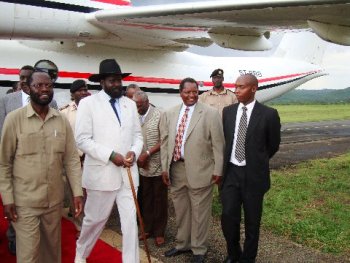South Sudan and Ethiopia discuss bilateral relations
By James Gatdet Dak
June 22, 2009 (JUBA) – The President of the Government of Southern Sudan, Salva Kiir Mayardit and the Ethiopian Prime Minister, Meles Zenawi, met in the Ethiopian capital, Addis Ababa and discussed bilateral relations between the two governments.

The leaders discussed the status of implementing the Comprehensive Peace Agreement (CPA) and the challenges faced in the peace deal as well as the role of IGAD countries of which Ethiopia is a member.
The Republic of Ethiopia and the semi-autonomous Southern Sudan last year signed a number of bilateral agreements on joint developmental projects at ministerial level.
Among the joint projects included roads connectivity between the two countries’ neighboring states. These include Upper Nile, Jonglei and Eastern Equatoria states on Southern Sudan side and Gambella, Beni Shangul and Southern Nationalities regions on the Ethiopian side.
Upper Nile and Jonglei states would be connected with Gambella region by separate roads while Southern Nationalities region would connect with Eastern Equatoria state and vice versa.
They agreed to develop close economic ties, particularly in the areas of trade and building of capacity. Ethiopia also agreed to export 50% of its cement production to Southern Sudan to try to meet the demand for cement in the region.
The Ethiopian government also agreed last year to connect Upper Nile’s capital, Malakal and Jonglei’s capital, Bor with the electricity from Gambella region.
The two governments also agreed on the need to further strengthen good relations between their local populations who share ethnicities, cultures and languages on both sides of the borders.
Gambella region in Ethiopia is predominantly inhabited by Nuer and Anyuak ethnicities that constitute about 80% of its political leadership.
The same tribes are also found on the other side of the Southern Sudan borders in Upper Nile and Jonglei states.
President Kiir directed the concerned ministers of the Government of Southern Sudan to follow up the implementation of joint projects with their respective counter-parts in Ethiopia.
(ST)

khamis Isaac
South Sudan and Ethiopia discuss bilateral relations
Dear Kiir, you need focuses on security before any development on South Sudan and Ethiopia border. as you know that some of the Ethiopian Nuer and Anyuak Communities are against the current Ethiopian government because they are being vitimise becuase of their support to the former government in which they will try what they can to disrupt the South Sudan relationship with their counterpart Ethiopia.
I would therefore advice you to included disarmment on your discussion on both sides.
well Ethiopia has been our best friend since the movement began in 1983 and they are still what they can in order South Sudan to achieved what we were fighting for.
To connect the power line between Ethiopia and South Sudan need Nuer and Anyuak on both sides to be full disarmed as well as Murle in Sudan.
Anyuak community is easy to disarmed because of their good understanding to both governments.
Jabeessa
South Sudan and Ethiopia discuss bilateral relations
Well, that is pretty good. South Sudan and Ethiopia have been discussing and signing some agreements. That looks good. But, one thin! Does Ethiopia aware of provocating its biggest ally in the region, i.e, Sudan? What if Sudan says, “enough is enough!” Stop making any agreement with unrecognized entity as a state? What if it says “South Sudan is not yet a country to make agreements with?”. Ethiopia, I think, must deal with such questoins before rushing into signing agreements, especially on “SECURITY”. All the agreements should be in line with the law of Sudan. There is I think where Ethiopia should look into.
raanaguachraan
South Sudan and Ethiopia discuss bilateral relations
dear DR Kiir, it’s good moves want i see how you are working toward development in south Sudan. it’s your duties as president
of GOSS. you have now nearly achieves your politically, socially, economically, and securities strategies. the most basically things for war tore country is electricity, roads, water, schools, hospitals, and commercials centers.
and thanks you all.
by Red ARMY.
Ojal
South Sudan and Ethiopia discuss bilateral relations
Peter Pal
Shame on you man. Don’t claim to know history. Which history do you know? It is of bloodshed and killing tribesmen and neighbours.
Don’t clean Nuer in the media as peacekeepers.
Nuer is the most violent tribe that can’t live among itself and neighbours without bloodshed.
Just read from media how many conflicts Nuer has undertaken with Jinkay Nuer and other tribes.
And the 8 innocent people you are alleged to have been killed by Anyuak were proved to have been killed by Nuer. The Anyuak massacre of Dec.13.2003 was the highlander strategy of wind out black people especially the Anyuak who are the land owner and chase away the refugees who are claiming to be Ethiopian citizen by bloodshed and land occupants.
And you should know that Salva Kiir will not be a president because of Nuer. No, you are wrong. He will be President if Southerners want but not Nuer alone. Which Nuer are you talking about? The money lover that Arab uses as talking tools to destabilise Southern Sudan. Who will give Nuer a presidency even Ngudeng will not, his prophecy were lie.
Look at yourself and have a trust in yourself that Nuer is the most violent people but not peacekeeper, if you talk of Anyuak and Equatorians can be right as peacekeepers.